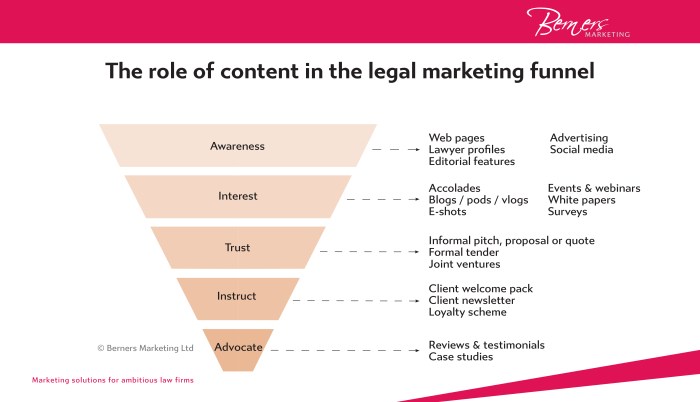Building a Strong Law Firm Brand with Web Marketing: Strategies for Success
Kicking off with Building a Strong Law Firm Brand with Web Marketing, this topic delves into the essential strategies and elements required to establish a robust brand presence in the legal industry.
From branding importance to online advertising, this guide covers all aspects necessary to create a reputable and recognizable law firm brand through web marketing.
Importance of Branding in Law Firms
Branding plays a crucial role in setting law firms apart from their competitors and establishing a unique identity in the market. It goes beyond just a logo or a name, encompassing the firm's values, reputation, and the overall client experience.
Successful Law Firm Brands and Strategies
- One example of a successful law firm brand is Cravath, Swaine & Moore LLP, known for its elite status and longstanding reputation for excellence. Their brand strategy focuses on delivering high-quality legal services and building lasting client relationships.
- Another example is Baker McKenzie, a global law firm with a strong brand presence in multiple countries. Their strategy includes a focus on diversity, innovation, and a client-centric approach to legal services.
- Firms like Latham & Watkins have successfully leveraged their brand to expand their global reach and attract top legal talent. Their brand strategy emphasizes a collaborative and entrepreneurial work culture.
Impact of a Strong Brand on Client Acquisition and Retention
A strong brand can significantly impact a law firm's ability to acquire and retain clients. Clients are more likely to choose a firm with a strong brand reputation, as it signals trust, reliability, and expertise. A well-established brand can also lead to client loyalty and repeat business, as clients are more likely to return to a firm they trust and have had a positive experience with.
Elements of a Strong Law Firm Brand
Establishing a strong brand is crucial for law firms to differentiate themselves in a competitive market. Several key elements contribute to a strong brand in the legal industry, including the logo, colors, typography, and messaging. Let's delve deeper into these elements and compare branding strategies of large law firms with small boutique firms.
Role of Logo, Colors, Typography, and Messaging in Branding
- Logo:A well-designed logo can instantly convey the values and identity of a law firm. It serves as a visual representation of the firm and helps in creating a memorable brand image.
- Colors:The choice of colors in branding plays a significant role in evoking emotions and perceptions. Law firms often opt for professional and sophisticated colors like blue, black, and gray to convey trust and reliability.
- Typography:Consistent typography across all marketing materials is essential for brand recognition. The fonts used should align with the firm's image and values.
- Messaging:Clear and compelling messaging helps in communicating the firm's unique value proposition to clients. It should be consistent across all communication channels to build trust and credibility.
Branding Strategies of Large Law Firms vs. Small Boutique Firms
- Large Law Firms:Large law firms often focus on establishing a corporate and professional image through their branding. They invest heavily in marketing efforts, including digital advertising and sponsorships, to increase brand visibility on a national or global scale.
- Small Boutique Firms:Small boutique firms, on the other hand, emphasize personalized service and niche expertise in their branding. They may use a more creative approach to stand out in a competitive market, leveraging networking events and targeted content marketing to attract clients.
Building an Online Presence
Establishing a strong online presence is crucial for law firms to reach a wider audience and build credibility in the digital age. A website serves as the virtual storefront of a law firm, offering valuable information to potential clients and showcasing the firm's expertise.
Importance of a Website
A website is often the first point of contact between a law firm and a potential client. It not only provides essential information about the firm's services, areas of expertise, and contact details but also creates a lasting impression on visitors.
A well-designed website can help establish trust and credibility, setting the tone for a positive client-lawyer relationship.
Tips for Creating a User-Friendly Website
- Ensure clear navigation: Make it easy for visitors to find the information they need quickly and efficiently.
- Optimize for mobile: With the increasing use of smartphones, ensure your website is mobile-responsive for a seamless user experience.
- Include informative content: Provide valuable resources, such as blog posts, articles, and FAQs, to showcase the firm's expertise and educate visitors.
- Use professional design: Invest in a clean and professional design that reflects the firm's brand and instills trust in visitors.
- Include clear calls to action: Guide visitors on the next steps to take, whether it's contacting the firm for a consultation or signing up for a newsletter.
Role of Search Engine Optimization ()
plays a crucial role in improving a law firm's online visibility and attracting organic traffic to the website. By optimizing website content, meta tags, and s, law firms can rank higher in search engine results pages, making it easier for potential clients to find them online.
Implementing best practices can significantly enhance a law firm's digital presence and increase the chances of converting website visitors into clients.
Content Marketing for Law Firms
Content marketing plays a crucial role in the success of a law firm's marketing strategy. High-quality content not only helps in increasing visibility online but also establishes credibility and thought leadership in the legal industry.
Creating Engaging Legal Content
When creating content for a law firm, it is essential to focus on providing valuable information that is engaging and informative. Here are some ideas for creating engaging legal content:
- Blog Posts: Regularly updating a blog with relevant legal topics, case studies, and industry news can help attract and retain visitors to the law firm's website.
- Articles: Publishing articles on legal issues, changes in legislation, or insights into specific legal areas can showcase the expertise of the firm's attorneys.
- Case Studies: Sharing success stories and real-life examples of how the firm has helped clients can demonstrate the firm's capabilities and expertise.
Benefits of Content Marketing
Content marketing offers several advantages for law firms, including:
- Building Credibility: Consistently producing high-quality content can establish the law firm as a trusted authority in the legal field.
- Enhancing Thought Leadership: By sharing valuable insights and expertise through content, law firms can position themselves as thought leaders in their practice areas.
- Improving : Creating optimized content can help improve the law firm's search engine rankings, making it more visible to potential clients searching for legal services online.
Social Media Strategies for Law Firms
Law firms can greatly benefit from leveraging social media platforms to enhance their brand presence and connect with a wider audience. By utilizing social media effectively, law firms can establish themselves as thought leaders in the legal industry and engage with potential clients in a more personal and interactive way.
Leveraging Social Media Platforms
- Utilize platforms like LinkedIn to showcase expertise, share valuable insights, and connect with other professionals in the legal field.
- Use Twitter to provide real-time updates on legal news, case outcomes, and important information relevant to your target audience.
- Engage with the community on Facebook by sharing informative articles, hosting live Q&A sessions, and showcasing the human side of your firm through behind-the-scenes content.
Examples of Successful Social Media Campaigns
-
Smith & Smith Law Firm launched a viral campaign on Instagram, featuring client testimonials and success stories, which significantly boosted brand awareness and lead generation.
-
Jones Legal Group's Twitter campaign, #LegalTipTuesday, gained traction among followers by providing weekly legal tips and advice, positioning the firm as a trusted resource in the legal community.
Consistent Brand Voice Across Channels
It is crucial for law firms to maintain a consistent brand voice across all social media channels to ensure brand integrity and recognition. By establishing a cohesive tone, style, and messaging strategy, law firms can build trust and credibility with their audience, reinforcing their brand identity in the digital landscape.
Online Advertising for Law Firms

Online advertising plays a crucial role in promoting a law firm's brand by increasing visibility, attracting potential clients, and establishing credibility in the digital space. By utilizing various advertising platforms, law firms can reach their target audience effectively and drive conversions.
Comparing Different Advertising Platforms
- Google Ads: Google Ads allows law firms to target specific s related to their practice areas, ensuring that their ads appear prominently in search engine results. This platform offers a high level of customization and targeting options to reach potential clients actively searching for legal services.
- Social Media Ads: Social media platforms like Facebook, Instagram, and LinkedIn offer law firms the opportunity to target specific demographics based on interests, location, and behavior. These ads can help increase brand awareness, engagement, and drive traffic to the firm's website.
- Display Ads: Display advertising involves placing visual ads on websites, apps, or social media platforms to increase brand visibility. Law firms can use display ads to retarget website visitors or reach new audiences based on their online behavior.
Tips for Creating Effective Online Ad Campaigns
- Define Clear Goals: Before launching an online ad campaign, clearly define the objectives you want to achieve, whether it's generating leads, increasing website traffic, or building brand awareness.
- Target the Right Audience: Identify your target audience based on demographics, interests, and online behavior to ensure that your ads reach the most relevant potential clients.
- Compelling Ad Copy: Craft attention-grabbing ad copy that highlights your unique selling points, services, and value proposition to entice users to click on your ads.
- Optimize Landing Pages: Ensure that your ad campaigns direct users to relevant landing pages that provide valuable information and a clear call-to-action to encourage conversions.
- Monitor and Adjust: Regularly monitor the performance of your online ad campaigns, analyze key metrics such as click-through rates and conversions, and make adjustments to optimize campaign performance and ROI.
Monitoring and Measuring Brand Success
In order to track the success of a law firm's branding efforts, it is essential to utilize various tools and metrics to analyze website traffic, social media engagement, and online leads. By monitoring these key indicators, firms can make data-driven decisions to optimize their branding strategies.
Tools and Metrics for Tracking Brand Success
- Google Analytics: Utilize this tool to track website traffic, user behavior, and conversion rates. Identify which marketing channels are driving the most traffic and leads.
- Social Media Analytics: Platforms like Facebook Insights, Twitter Analytics, and LinkedIn Analytics provide valuable data on audience engagement, reach, and demographics. Use this information to tailor content and engage with your target audience effectively.
- Lead Tracking: Implement lead tracking software to monitor the source of online leads and conversions. This allows firms to attribute success to specific marketing campaigns and channels.
- Brand Awareness Surveys: Conduct surveys to gauge brand recognition, perception, and loyalty among your target audience. Compare results over time to measure the impact of branding efforts.
Strategies for Adjusting Branding Strategies Based on Performance Data
- Identify Key Performance Indicators (KPIs): Determine which metrics are most important for measuring brand success, such as website traffic, social media engagement, and lead conversion rates.
- Regularly Analyze Data: Monitor performance data on a regular basis to identify trends, patterns, and areas for improvement. Use this information to refine branding strategies and optimize marketing campaigns.
- A/B Testing: Experiment with different branding strategies, messaging, and visuals to see which resonates best with your target audience. Use A/B testing to determine the most effective approach and make data-driven decisions.
- Stay Agile: Be prepared to pivot and adjust branding strategies based on performance data and market trends. Stay agile and responsive to ensure your firm remains competitive and relevant in the digital landscape.
Ultimate Conclusion
Concluding the discussion on Building a Strong Law Firm Brand with Web Marketing, it's evident that a well-crafted online presence and strategic marketing efforts are imperative for law firms looking to stand out and attract clients in today's digital landscape.
Helpful Answers
How does branding set law firms apart?
Branding helps law firms establish a unique identity and differentiate themselves from competitors, making them more memorable to clients.
What role does play in building an online presence for a law firm?
is crucial for improving a law firm's visibility online by ensuring the website ranks higher in search engine results, driving more organic traffic.
Why is maintaining a consistent brand voice important on social media?
Consistent brand voice across social media platforms helps reinforce brand identity and fosters trust and recognition among the audience.




